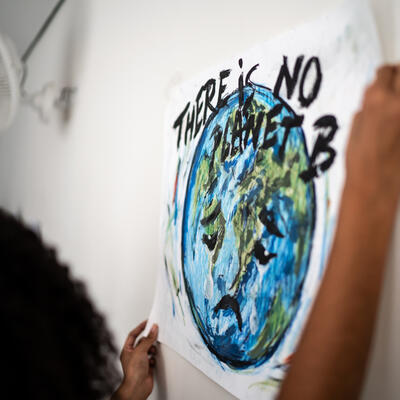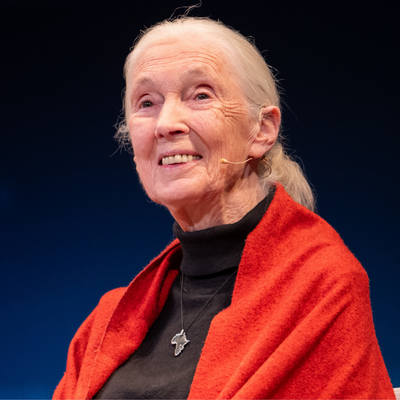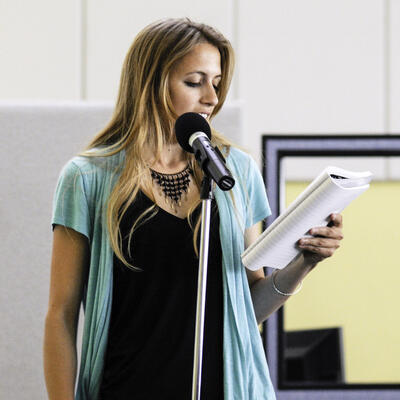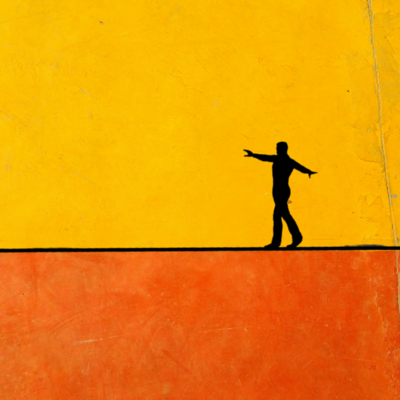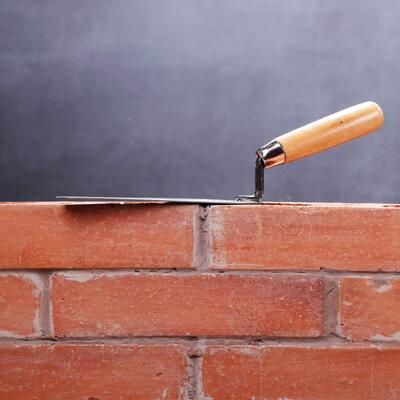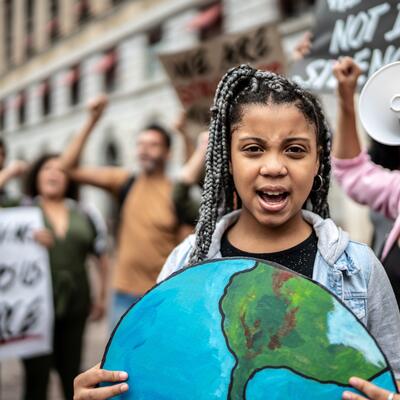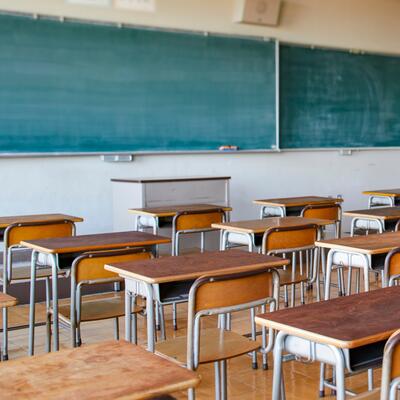
How Students and Teachers Are Talking About Climate
Guests
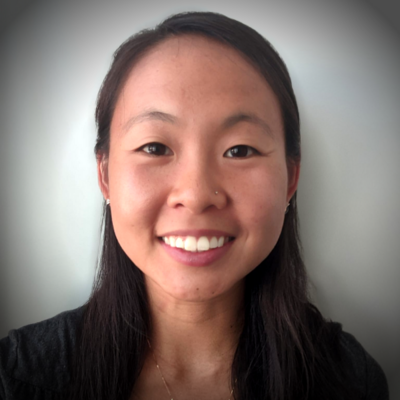
Margaret Wang-Aghania
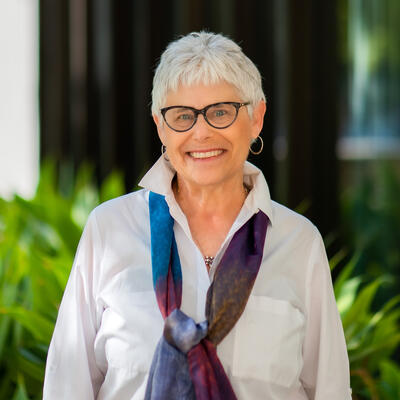
Robin Cooper
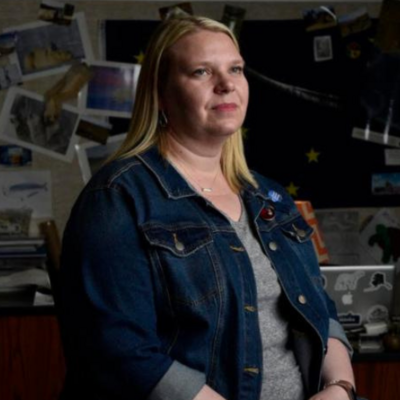
Melissa Lau
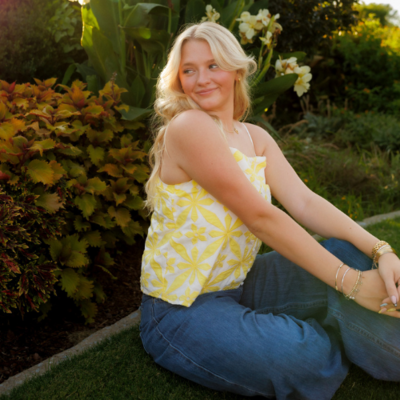
Leah Christenson
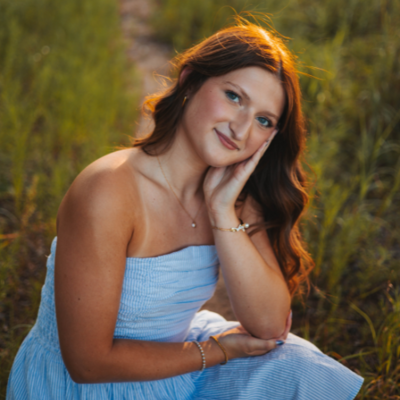
Alyson Dennie
Summary
Students are heading back to school, and in addition to all of the usual challenges of the school year, students and teachers have to deal with the realities around climate change.
It has been tough for teachers to navigate how best to bring climate information into their classrooms. Margaret Wang-Aghania, executive director and co-founder of SubjectToClimate, says, “We have these wonderful teachers, so the issue was that they just don't have enough time.” That’s where her organization comes in, SubjectToClimate has created science-backed resources and lesson plans for teachers that are ready to go.
Traditionally, climate disruption has mostly been taught – if it’s been taught at all – in the science classroom. But Wang-Aghania says, “If it were a science problem and just a science problem, we would've solved this already.” . That’s why she advocates for teachers of all subjects to incorporate climate themes into their lessons. They even have lesson plans for music and art classes, “In a music class, you would get an assignment to compose a musical composition using legato and staccato. But now, afterwards they think they're, they're gonna do that for a climate moment or event that they care about,” says Wang-Aghania.
“I've never really been scared of the change in itself, but I think it's the speed and the rate at which things are changing. That makes me feel kind of helpless,” says Alyson Dennie, a high school student in Piedmont, Oklahoma. Leah Christenson, also a high school student in Piedmont says that it can be challenging to know what to do with emotions tied to the climate crisis, “I'm not sure how I deal with that. I'm still trying to figure that out 'cause it just bottles up inside me sometimes. And then I have little outbursts.”
These feelings can be overwhelming to anyone, regardless of age. And according to a survey in The Lancet, around 60% of young people are very anxious about the climate crisis.
“Their feelings are across a whole variety of spectrums.They're feeling a lot of anxiety. They're feeling dread, they're feeling fear,” says Robin Cooper, co-founder and president of the Climate Psychiatry Alliance. So what can the adults in young people’s lives do to help handle these strong emotions?
“First they have to be understanding what the real world issues are and also be connected to managing their own climate anxiety so it doesn't exaggerate or spill over to what the kids are burdened with,” says Cooper. Validation of their fears and honesty are also key to helping young people navigate their feelings. But Cooper says grownups need to tailor their approach to the developmental stage of the kids they’re talking to, “modulating what is tolerable to their emotional capacities.”
“Living in Oklahoma, you can run into some conflict, considering that agriculture and fossil fuels are two major industries in our state,” says Melissa Lau, high school environmental science teacher in Piedmont, Oklahoma. She feels that teaching about the climate crisis is crucial, and how she communicates the information is where the challenge starts, “I had to start figuring out how am I gonna do this in a non-confrontational way.”
“My family benefits from the fossil fuel industry. I have family members that have that work for fossil fuel companies. I share that with my students,” says Lau.
“My hope is: the more teachers that we can equip and empower with the resources that they need, and then the more students are then equipped and empowered with the information that they need as they move forward into becoming citizens in our communities,” says Lau.
This episode features a field piece by Mary Catherine O'Connor, who originally reported the story for KALW Public Media.
Resources From This Episode (3)
Full Transcript
Note: Transcripts are generated using a combination of automated software and human transcribers and may contain errors. Please check the actual audio before quoting it.
Alyson Dennie: My name is Aly Dennie. I'm a high school senior in Piedmont, Oklahoma. I’m on the pom team. We have like a summer camp and we were on a break and we were talking about ChatGPT, and they had no clue how much energy it used up and how bad it was for the environment. And I was telling them that and they were like, okay, but like I still don't get it. Like how is this thing in my hand bad for the environment? And I was like, oh, guys. And I went on and on and then we went back to class and then they were telling our teachers and our coaches about it, and then I had to tell them too, and it was this big thing. They're like, wow, you're so wise. But it did make me feel better because now they know.
Ariana Brocious: That was Alyson Dennie, a high school student from Piedmont, Oklahoma. Really it’s remarkable to hear young people talking about these things. They know so much and I think we forget that sometimes. We think that high schoolers are so focused on their own social lives. They’re already citizens engaged in lots of things, you know?
Kousha Navidar: I got to talk to Aly. And I had such an enjoyable time. And you’re right, hearing her talk about her thoughts on chat GPT and the role that our daily lives play in the wider climate context was really interesting and invigorating. And I feel really lucky to do it. So shout out to Aly And that’s what we’re talking about today is going back to school and what that means in the climate context. I’m Kousha Navidar.
Ariana Brocious: I’m Ariana Brocious. And this is Climate One. Labor Day is over, summer is ending and all over the country kids are heading back to school.
Kousha Navidar: Yeah, sharpened pencils, packed lunches, and school buses on the road. The bell that goes off in the classroom at what, 7:15 then 7:25 then 7:30. I was a high school math teacher so there are very visceral things that come back to my mind when I think of back to school.
Ariana Brocious: You sound really agitated by the bell.
Kousha Navidar: I did not like the bell. (laughs) But there are many other things I did like, meeting new students, meeting new parents, getting to talk about triangles. I love 30 60 90 triangles. There’s a lot that is there. A lot of challenges too.
Ariana Brocious: Right, and in addition to all the usual challenges of the school year, teachers across the country are trying to figure out how to talk about climate disruption in their classes – or even if they should talk about it.
Kousha Navidar: Yes, especially in this - excuse the pun - political climate, human-caused global heating can be tricky to talk about in schools.
Ariana Brocious: But it’s important to talk about. Because it’s taking a real toll on young people. According to a survey in The Lancet, 60% of young people described themselves as very or extremely worried about climate change.
Kousha Navidar: Clearly, there is quite a bit here for students, parents, and teachers to deal with.
Ariana Brocious: So today we’re going to talk about what it’s like for teachers to bring climate into the classroom, how adults can help kids deal with the emotions related to the climate crisis, and how teachers can make climate a part of their lesson plans.
[music change]
Kousha Navidar: Margaret Wang-Aghania is Executive Director and co-founder of SubjectToClimate, an organization that creates resources and lesson plans for teachers who want to teach about climate in their classrooms. She spoke with our colleague Austin Colón about this ah-ha moment she had when she was an economics teacher.
Margaret Wang-Aghania: Every year, uh, the externalities and market failure unit was the hardest to teach. It's one of those abstract concepts that students just didn't understand. They're like, okay, I don't get it. You're just moving a graph around. And it wasn't until I had a particular student who actually was repeating a social studies course, and she needed to pass this class, and she didn't see herself as an economist. This didn't make sense. But what she did care about was a lot of the injustices she was seeing. And specifically she was also very concerned about animal welfare and rights. So we talked about the cost of meat. And our, we did this whole video about what is the true cost of meat because you are paying very little for that burger that you are buying from McDonald's. Does it truly cost that much? We started getting into that and then this, it became a light bulb moment when I understood externalities is everywhere. Sustainability isn't a separate issue. It's a lot of what makes these concepts come to life. And I am happy to say that by the way, she ended up thinking about how do we change people's behavior after knowing about market failure and started doing these campaigns at school. And she did pass the class too. So that was like an aha moment for me where like, well, here's something from my personal life that I can bring in. Not because it's an extra burden, but because it helps my students understand a concept more concretely.
Austin Colón: Yeah. And that's, that's an amazing story. I mean, yeah, when people can connect to a concept in that personal way that really does drive home, you know, not only the lesson you're teaching, but the real world applications and I, I come from a family of educators. Um, and my mother is a music educator specifically. And so when I was looking on Subject to Climate's website, I was really excited to see that there were music lessons that incorporate climate themes. And, that can be tricky with the arts to, to have climate in those lessons. So how do lessons like that get developed?
Margaret Wang-Aghania: Yeah. So, having an educator background, one of the points of views I come in with is that teachers know what work in the classroom, the best teachers are experts. And oftentimes when we're trying to figure out education solutions, for some reason we don't ask teachers, we don't see what teachers are doing. We come with a, um, an asset deficit mindset where like, we need more resources to do X, Y, and Z. Let's bring in experts and consultants when. I see it as a, like we have these wonderful teachers. So the issue was that they just don't have enough time. So what we did was we started looking at teachers who are already experts 'cause their classroom teachers did math in English, in social studies and music, like the music lesson that you saw. And we did simple training on basics on climate and asked them to think about how does it connect to the topics you already teach? And then we work with them to create a lesson plan. Oftentimes they just don't have time to do, like, let me make it into a lesson plan and create these slideshows that is usable for everybody else. As a teacher, I only the time to create lesson plans for myself. So then we started training cohorts of teachers taking their lesson plans, working with them, and then doing the publication aspects of it. So, you know, just amplifying the amazing work that they're already doing in their class.
Austin Colón: Mm-hmm. And do those, uh, lessons that the teachers develop, do they get checked by any scientists to make sure that the climate portion that they're incorporating is accurate?
Margaret Wang-Aghania: Yeah, so we do have a scientist task force, um, that also relieves our teachers of, sometimes it's just intimidating, like, okay, I am a music teacher, or I'm an English teacher. I've never been taught about climate change. And yes, I did this basic training, but there's a lot of misinformation out there. So we are, we let the teachers know that there's a review process and um, we have a scientist task force reviewing all of the lessons that the teachers create.
Austin Colón: And could you give us just a brief overview of like one of those lessons maybe for, uh, one of the music lessons.
Margaret Wang-Aghania: Yeah, all of our lessons have a similar framework.we do what is called three Is. So we always start with the inquiry. Inquire is the first step. So where students are noticing, wondering, and thinking and developing curiosity, And then the second I is investigation. This is where you're learning your disciplinary concept and tools. In this case it's music, and then you're using that tool to. Start to answer your inquiry. And the third step is inspire. Um, this is really important because you just, you don't wanna just teach students, um, uh, a problem and then go like, okay, well have fun solving it. We don't wanna leave students with, uh, climate anxiety. Therefore, the inspire section is like, okay, now what are you gonna do about it? Or, because we don't want the burden to be just on them. What are other people doing about it? So then I can, uh, walk you through the lesson plans you specifically were talking about the music lesson. This one is about legato. It's staccato, right?
Austin Colón: Right. Yeah.
Margaret Wang-Aghania: So the first step in the inquiry is actually thinking about how expressing an idea musically is different from expressing the same idea with words. So it's a discussion. They're starting to think and explore and they're noticings. And then the second thing is like, oh, let's investigate how that's done. And they actually listen to two movements by a climate composer and look at how legato and staccato represents climate impacts. So this is where they're learning what is legato, what is staccato, and they're investigating some of the earlier questions they had, like why would one choose to express in music rather than in words?
Austin Colón: and for somebody who may not know legato is when a note lingers for a long time or a longish time, and staccato is very short notes.
Margaret Wang-Aghania: Yes, exactly. And you know, they're learning the musical effects of why you would leverage legato versus the staccado. When would you use it? Why would you use it? And this is something you would learn in music anyways.
Austin Colón: Yes. And, and it's really important too because, I mean, we connect music with emotions and, learning how somebody who's composing something based on their feelings about climate, how it's reflected in music. That's a really, really engaging. Topic. I wish I had had something like that when I was in high school 'cause that sounds like a lot of fun.
Margaret Wang-Aghania: Yeah, they, they do listen to like other, um, musicians and their interviews of why they chose to compose a certain piece and why. And so that's really cool that they can see how music can be leveraged for, um, like social movements. And then the last piece is the inspire. So they might now. In a music class, you would get an assignment to compose a musical composition using legato and staccato. But now, afterwards they think they're, they're gonna do that for a climate moment or event that they care about. And so that is just one example of how you can integrate it into other classes.
Austin Colón: And what would you say to teachers who might be kind of skeptical about the need for introducing climate outside of the science classroom?
Margaret Wang-Aghania: I would say that if it were a science problem and just a science problem, we would've solved this already. We have all the technology, all the, like the data out there. We know what we need to do. We have to do it, but we haven't done it. So if we continue to do the same thing that we're doing, which is, we'll barely talk about it, but if we only talk about it, we treat it as a science concept, then we're not gonna solve the problem. This is a mindset shift. It's a cultural shift and that's why it touches all subjects. We need English to communicate. We need English to understand what is misinformation out there and what isn't. We need social studies to understand movements, economics, to understand trade offs and incentives. We need art just like in music to communicate and build movements, it hasn't worked to just teach it in science.
Austin Colón: And what feedback are you getting from students and parents about how climate is being taught?
Margaret Wang-Aghania: Yeah, it's actually interesting because we have a lot of data out there. Um, already most American teachers and parents actually want climate change to be taught in the classroom. I know Yale did a survey and majority of people even beyond political lines want global warming to be brought into the classroom. Um, so that's a surprising fact that people don't know.
Austin Colón: Yeah, that. Yeah, that is pretty surprising.
Margaret Wang-Aghania: And most students want the climate to be taught in the classroom. Most students don't feel confident about their understanding of climate change and solutions and they already demonstrate misunderstandings about climate change. I know there was some, a study done by, this is Planet Ed from the Aspen Institute, um, that shows that teens, for example, are vastly overestimating the role of recycling in a solution because that's what is being taught.
Austin Colón: Right. And there are some real difficulties that teachers are running up against. One I noticed is that, you know, climate data is being removed from government websites and what kind of impact has that had on teachers trying to get accurate information for their lessons?
Margaret Wang-Aghania: Yeah, so I mean, we see it firsthand. Um, a lot of the lesson plans that our, the teachers have created that we talked about leverage a lot of federal data, climate data. And that's one indication because those are lessons that represent what they're teaching the classroom. And a lot of those links were broken at some point. So we had to actually go and find replacement information and data. I mean, we're a nonprofit and this is our role, right? But for a lot of teachers, um, unfortunately the biggest issue teachers face is that they just don't have enough time. And I remember that being the case when I was a teacher. So if there was a lesson that I was gonna teach and I don't have that data set anymore, I'll likely just teach something else because I don't have that time to go and find that data.
Austin Colón: I remember that when I was growing up. My mother would say the same thing. We just not, not enough hours in the day. What professional development do you offer teachers who want to be more well versed in climate issues?
Margaret Wang-Aghania: Yeah, so in Subject to Climate, we see ourselves as the one-stop shop just to make it easier for whatever a teacher needs at any point of their journey in teaching about climate, all grade levels in all subjects that looks differently in professional development. So just like we aggregate resources, we also aggregate professional development. There are some teachers who prefer to enroll in a course that you get credit for. There are some that don't have the time and just wanna read articles on how they may approach climate change. So we have that as well. Asynchronous modules. Live classes. Live sessions in person. So we have aggregated those opportunities. We also have developed our own asynchronous modules, um, where there's level zero, which is our, like the fundamentals of climate change. Level one is how do I integrate it into across subjects and grade levels and level. Uh, two is how do then I, how do I create my own lesson plan? So we have that, um, as well. And if you take it, you can actually submit your, um, homework as you will say, um, to the NEA, the National Education Association, and get a microcredential to honor your work of taking the time and effort to learn about climate change and climate education.
Austin Colón: Well, that's really cool and I hope that, students and teachers use those resources when they get a chance and become more well-versed and connected with the climate issue that we're all facing.
Margaret Wang Agana is executive Director and co-founder of Subject to Climate. Margaret, thank you so much for joining us on Climate One
Margaret Wang-Aghania: Yep. Thank you so much, Austin.
Kousha Navidar: Coming up, how the grownups in kids' lives can help navigate feelings like climate anxiety.
Robin Cooper: parents need to be there. Honest and validate feelings in reality, but not overwhelm kids
Kousha Navidar: That’s up next, when Climate One continues.
Ariana Brocious: Help others find our show by leaving us a review or rating. Thanks for your support!
This is Climate One. I’m Ariana Brocious.
In addition to juggling homework, tests, and navigating friendships, many kids nowadays are dealing with the fact that the climate crisis is altering their future.
Alyson Dennie: My name is Aly Dennie. I'm a high school senior in Piedmont, Oklahoma. My dad is in the oil and gas industry and he's always taught me that the changing of climate is something that's normal and that's supposed to happen. and so I've never really been scared of the change in itself, but I think it's the speed and the rate at which things are changing that makes me feel kind of helpless because I know that I'm doing my part. But not everybody knows what their part can be. And so it's like what can really change? I wish that more people knew that every single thing that they do impacts our world like either positively or negatively. It does have an impact.
Leah Christenson: My name's Leah Christensen. I'm a senior at Piedmont High School and I'm 17 years old. I feel one, a little uncomfortable about the fact of climate change and one a little bit mad. I don't like the idea of change. I like the idea of things staying the same, and so when things happen to disrupt and cause change, it makes me feel uncomfortable. And the whole mad situation. I, whenever people are ignorant to what they're doing, that's why I get kind of mad. I'm not sure how I, how I, um, deal with that. I'm still trying to figure that out 'cause, uh it just bottles up inside me sometimes. And then I have little outbursts, so I'm not really sure how I should deal with that at the moment. My best way I can figure, um, I'm really trying to figure that out with so far is, uh, just educating people because I really feel like it just comes down to people being uneducated about it because if I feel like if people knew more, then they wouldn't act the way they do.
Ariana Brocious: These feelings can be overwhelming to anyone, regardless of age. But kids aren’t in this alone. To find out how best to help young people navigate their climate related mental health issues, I spoke with Robin Cooper, Co-Founder and President of the Climate Psychiatry Alliance.
Robin Cooper: Kids are feeling a lot of distress about what they know about the impacts of climate change and the enormity of what they're feeling and their feelings are across a whole variety of spectrums. particularly for teens, but younger kids also, they're feeling a lot of anxiety. They're feeling dread, they're feeling fear, and they're feeling a sense of doom and hopelessness. Will there be a world that I will grow into for little kids? Is the world gonna die? Am I gonna die for teens? Will there be a world that's a viable place for me to live in in the future? Should I, could I have children in the future? What will my future be? And a lot of doom and feelings of hopelessness. They feel a lot of anger. Betrayal, betrayal that the grownups in their world have have left them with these burdens and not protected them, and a lot of sadness and grief about what they're seeing.
Ariana Brocious: That's a lot.
Robin Cooper: It's a whole lot for young people to have on their shoulders, really a lot.
Ariana Brocious: And they're not wrong. I think I'm not a young person, I have feelings, similar feelings, which we'll get into kind of the adult version of this in a minute. But from what you've observed on average, how well equipped are the adults in young people's lives, to handle these problems?
Robin Cooper: Well, it depends on who the adults are. And I'm gonna call it, the parent club. Those grownups that are beyond just their, their parents, their grandparents, their teachers, their coaches, their. Aunts and uncles, it's very variable and it depends on how connected those grownups are to the, to the worries about climate change. Whether those grownups have been able to face their own worries and deal with them in effective ways so that they're not overwhelming. So it's widely variable, but I think the grownups that parent club need a lot of help in managing to guide their kids through this tough terrain.
Ariana Brocious: Yeah, I like the term grownups. to imply that there are a lot of responsible adults in children's lives. It's not strictly a parent, child relationship and that a lot of adults can influence and help kids navigate all kinds of things. So. How can adults who themselves have climate anxiety, address this issue with the children in their lives? Should they handle it first themselves? Should they model for the children the struggle of dealing with it? What are some of the ways they can try to do that?
Robin Cooper: Well, I think, grownups have a big responsibility to help kids navigate this. And first they have to be understanding what the real world issues are and also be enough connected to managing their own climate anxiety so it doesn't exaggerate or spill over to what the kids are burdened with. They have to be able to guide them with things that they are also doing so that kids don't feel abandoned and alone in managing this. That's kind of being partners with them. And you've also said how important it is to think about beyond just parents. Teenagers, particularly developmentally, are navigating separating from their parents. And sometimes then the ever present tensions between parents and teenagers need to be considered in that mix. And sometimes, uh, engagement with others than just parents. But that does not diminish the very important role of parents being attentive, alert and with their kids.
Ariana Brocious: Mmhmm. Yeah, this is similar to so many other kinds of parental advice, right? I mean, there's a lot of, talk about when you're maintaining boundaries, for example. You can still be there, sit with your kid, still say, no, you can be kind, you can still say no. so I hear that kind of being able to be there with your kids, not dismiss, not glaze over or gloss over their very real concerns. Um, and then try to give them some, I suppose, age appropriate answers. I mean, that's, that feels tricky. You know, I've dealt with this a bit in my, in my own life so far, and, it's sometimes it's hard to know how much a kid can take of, of the real truth that we're struggling with as adults.
Robin Cooper: I think you've mentioned two particular things that I wanna highlight that I'm so in agreement with you about. First is that the issues around climate distress and the threats that we're experiencing and the, and teens and kids grappling with this, is laid on normal developmental relationships as they grow. And that's true with teens and their relationships with grownups, but they're separating. They're also not there yet, so they still have a component that very much needs parents to be involved and protective. And the other is how to navigate appropriate, developmentally attuned responses about information. Sometimes I think grownups tend to think of kids as little grownups and talk to them in language that is way too complicated, not adhering to the, the reality that kids bring in information in developmentally appropriate ways. So little kids are very concrete, and teenagers are beginning to understand in more nuanced ways, but still see things, uh, in overwhelming ways. So parents need to be there. Honest and validate feelings in reality, but not overwhelm kids and know that sometimes what they say can just go right over their head if they're talking in too abstract ways.
Ariana Brocious: Right. And you've just touched on, um, a key component of all this, which is trust, right? In building that trust, continuing to maintain that. So when we spoke earlier, you described how your father talked to you about the threat of nuclear war, not climate, but also a very scary, scary threat, when you were a child. So can you share that story?
Robin Cooper: It's a story that guides my thinking now and it's very personal. Um, as you mentioned, it was at the time when this other existential threat was coming into my consciousness as a kid. I was little, maybe I was seven-ish or so, and it was the time of nuclear weapons development and a lot of international conflict, and I asked my father, would I die in a nuclear war or would there be a, a nuclear war? And he said, absolutely no, this will not happen in your lifetime. I was enormously relieved at my, what is 7-year-old mind, and my father did right by protecting me. But later when I was an advocate to eliminate nuclear conflict. I was in my mid twenties, maybe, and I, um, said to my father, how could you tell me that? How could you tell me that it's just not true. You don't know. And he said to me. Robin, what was I gonna do? You were a little kid. My father held the position of knowing he had to protect me from overwhelming, catastrophic feelings, but what he didn't do, and what I would now do and tell him is that he didn't validate my concerns. He didn't say, yes, this is a very big concern. I'm concerned too. He didn't then say, we can do things about this and we can do things together in facing what is really a true thing. And he didn't help me then to see the nuances that I could tolerate even at that age. And that guides me to think about how grownups can be, with kids validating, being with them, but also protecting them from the enormity of the risk that can't be grappled with when you're that little.
Ariana Brocious: So we've covered a lot of ground. Let's give parents and teachers who we haven't really talked about much yet. A little bit of a guide to help address the psychological health of children and students, um, in this situation. So how would you help a parent or teacher identify in the first place that a child is struggling with something like climate anxiety or grief?
Robin Cooper: It is a really good question. What do you notice and what do you see? Watching to see if they are stalled in appropriate developmental tasks. The things that they should be achieving at the stage and age that they're in, are they able to involve themselves in schoolwork? Are they able to involve themselves with friends? Are they still experiencing or not pleasure in things that they used to get pleasure from? And that's a big thing to watch for. Are they retreating away from, uh, those places of engagement that are appropriate for them? Are they sullen? Watching for physical signs. 'cause little kids and bigger kids often express worries physically. Are they having changes in appetite in sleep or headaches? Are there emotional outbursts? And of course all kids and teenagers have that emotional outburst periodically. That's a part of learning how to regulate feelings and emotions. But are these happening more and what's the language around that? Are they talking and are they, are there thoughts that penetrate about doom of the world? And one of the things that I think is important in the surveys that have been done, that have identified these big feelings for teens is that it wasn't surprising for me to know that teens have these extensive big feelings, but they said that it interferes with their daily functioning. And that's something for the grownups, that parent club to watch for.
Ariana Brocious: Yeah, that's really significant. It's more than a fleeting thought you have.
Robin Cooper: Yes.
Ariana Brocious: Once you recognize these challenges in a student or a child in your life, what would you recommend as a next step?
Robin Cooper: Again, curiosity is always the driver. validating their fears. As I said, my dad didn't do that. Yes, this is something of of concern that I have too. Honesty. But honesty in modulating what is tolerable to their emotional capacities and not assuming that we can burden kids with carrying this and then always. I am with you. I am here to do everything I can to make you safe, to make the world that you are gonna inherit be better. AndI think it's important for the parent club to model ways of engaging in activism and action. And so that activism and action for grownups can be very different. I spoke to a friend last night wondering how his 12-year-old grandson could tolerate it. His grandson always sees their engagement in activism as a guide and then joining kids in what they can actually do. What's happening in the clubs in your high school? How can I help you with that? Do you need me to drive you to those events? Can we go together, littler kids or even teenagers: Let's sit down and write a letter now to one of the people who has power here, our legislators, our leaders. We can do that together.
Ariana Brocious: How might a teacher's role differ from a parent?
Robin Cooper: Really good question. First off, I think teachers are heroes here. really important to integrate climate literacy in teaching kids and have that interspersed in appropriate ways throughout their curriculum. And teachers, however, I think have the difficult task of appropriately providing information, but not ignoring that the content they're teaching can be very, very stressful; for making room in the classroom and outside of the classroom to identify upset feelings to validate them, to say, this is tough stuff, and as we learn it together, you're gonna have big feelings and let's make sure that we have room to, to, to make sure that those are also something that we pay attention to. Helping kids with those skills, I think it's pretty, pretty common now for kids to learn about emotional regulation through deep breathing. It sometimes sounds corny, but let's breathe together 'cause it helps to settle our emotional places in our brain so we can learn this stuff together. And then again, the same, same eyes on kids who are having more severe difficulties and might need additional help.
Ariana Brocious: Robin Cooper is co-founder and president of Climate Psychiatry Alliance. Thank you so much for joining us on Climate One and sharing these excellent tips.
Music: in
Intro to second Station ID break:
Ariana Brocious: Coming up, a teacher responds to her students’ curiosity about the state of our Earth.
Melissa Lau: They do want to know more about how the mechanisms of the planet are working and then like, how is this being disrupted.
Ariana Brocious: That’s up next, when Climate One continues.
Kousha Navidar: This is Climate One. I’m Kousha Navidar.
In California, the Oakland Unified School District is working to reduce their climate-harming emissions by switching to electric school buses. Electric buses also improve public health, and they’ll help the district save money in the long run. But projects like these have run into trouble with recent changes in federal funding.
KALW Climate Reporter Mary Catherine O’Connor went to Oakland Unified School District to see these new school buses first hand.
MARY CATHERINE O'CONNOR: It is seven 30 on a Friday morning, and I'm in Deep East Oakland with Mateo Hernandez, who is really into my microphone.
MATEO HERNANDEZ: My name is Mateo.
MARY CATHERINE O'CONNOR: His mom, Lizbeth Zamora, is here too.
LIZBETH ZAMORA: Mateo is seven and he's in first grade.
MARY CATHERINE O'CONNOR: We are waiting for the school bus while Mateo chats away.
LIZBETH ZAMORA: He's been riding the bus since he was in preschool.
MARY CATHERINE O'CONNOR: But back then he didn't seem to enjoy it. His autism makes him sensitive to loud noises and smells.
LIZBETH ZAMORA: He would say it was loud and cover his ears.
MARY CATHERINE O'CONNOR: And even Lizbeth noticed the heavy exhaust when she walked him to the bus.
LIZBETH ZAMORA: I don't know, sometimes I would get a little headache.
MARY CATHERINE O'CONNOR: But that all changed this fall when a new bus started rolling up. Gone are those fumes, and the noise. I didn't even notice it approach, but Mateo spotted it.
MATEO HERNANDEZ: The bus is here.
MARY CATHERINE O'CONNOR: As the door closes and they pull away from the curb, it sounds more like a spaceship than a school bus.
Sound of the bus pulling away.
MARY CATHERINE O'CONNOR: That's because it's powered by batteries, not diesel. Lots of school districts across the country have one or two electric buses but Oakland is a different story.
Newsclips
KRON: The Oakland Unified School District made history today…
GMA: The first school district to swap all of its school buses to electric models…
Bloomberg: This is a really interesting development…
KPIX: …huge leap forward for an East Bay School district….
MARY CATHERINE O'CONNOR: Oakland Unified now has 74 electric buses. I spoke with the district's transportation director, Kim Raney. She told me the buses lower emissions and they better support the thirteen hundred students with special needs who ride the bus.
She says the diesel ones just didn't serve them well.
KIM RANEY: They're riding on a noisy bus, which already amps a lot of special needs kids up. You're smelling the diesel coming in, the fumes. It's hot. It's noisy.
MARY CATHERINE O'CONNOR: Here’s what it sounds like inside a diesel bus. Loud sounds of diesel bus. And to compare… this is one of Oakland’s new buses. Quiet electric bus.
The there’s a catch.
KIM RANEY: An EV, is about 300 grand. A regular bus. A diesel bus is about 125, 000 to 150,000…
MARY CATHERINE O'CONNOR: That’s a big difference--around twice as expensive. Plus, districts need to install charging stations, pushing the cost to switch even higher.
But Laura Deehan, the state Director for Environment California, says the extra cost is worth it.
LAURA DEEHAN: The diesel fumes can cause respiratory ailments. It's also been linked to impacts to the brain now and including ADHD and other behavioral issues. The idea that children with their developing lungs and their bodies that are so much more vulnerable to the impacts of exposure to pollutants, the idea that they would be exposed to that level of pollution every day, while they’re waiting at the bus stop or waiting for the bus. It's just absurd when we have alternatives, clean electric school buses that can transport children safely without that pollution.
MARY CATHERINE O'CONNOR: It’s dangerous for the drivers, too. Diesel exhaust can worsen asthma and is even linked to cancer and heart disease. And it’s not just that these buses are no longer powered by fossil fuels.
LAURA DEEHAN: One thing that's unique about school buses is that they're really not being used at all after school hours. And so you can then basically plug into that battery potential power and it can help, uh, meet the electricity needs of the community.
MARY CATHERINE O'CONNOR: So when, say, electricity demand spikes on a hot summer day, the buses can provide power, sending it back to the grid. Plus, electricity is a much cheaper fuel than diesel. And these electric buses have far lower maintenance costs. They could save Oakland up to $440,000 a year. (Editor’s note: that is based on an estimate of $6,000 yearly savings, per bus, by the Electric School Bus Initiative.)
But the upfront price tag is steep. Oakland's fleet and charging infrastructure reportedly cost north of $50 million over five years. Now, the school district isn’t on the hook for the whole amount. Here’s Laura again.
LAURA DEEHAN: California's been a major recipient of the federal funds that have come through the federal infrastructure law, and that's been great.
MARY CATHERINE O'CONNOR: President Biden’s clean School Bus Program set aside $5 billion for electric buses. School districts around the country have already received $1 billion of that, and another $2 billion was on the way. But when President Trump came into office, he directed the Environmental Protection Agency to freeze that money.
Since then, the money has been released … but Sue Gander of the DC-based Electric School Bus Initiative, says the delays caused damage.
SUE GANDER: It's put a lot of strain on school districts. It has put a lot of strain on dealers, and it puts a lot of uncertainty on the manufacturers who are looking to build out their production lines. not to mention the kids who are missing out on these cleaner and quieter rides to school.
MARY CATHERINE O'CONNOR: There’s also that other two billion dollars in the Clean School Bus program but the EPA hasn’t said when, or if, school districts will ever see that money… and they declined our request for an interview.
Here in California, the state has invested more than a billion dollars in clean school buses. But most school districts are a long way off from having fully electrified fleets. In Oakland, Kim Raney told me the quiet, cleaner rides are already paying off. She’s getting fewer reports of bus-related incidents. And back with Mateo at the bus stop, his mom, Lizbeth says she's seen an improvement too.
LIZBETH ZAMORA: He's doing much better. He participates more. His speech is also getting better. Yeah. And he's more social.
Kousha Navidar: Mary Catherine O'Connor originally reported that story for KALW Public Media in Oakland.
Earlier we heard a couple of students who shared their thoughts and feelings about the climate crisis. They go to Piedmont High School in Oklahoma. Melissa Lau, their environmental science teacher, told me about how a trip to the Arctic changed the way she thinks about climate.
Melissa Lau: so in 2018 I worked with a research team from Florida International University. I was there for 36 days. The team was there for longer.
Kousha Navidar: 36 days that's a long trip
Melissa Lau: It's a long trip. My husband was, was home alone a lot. Um, so, um, but uh, yeah, the first two weeks, um, I was in the northernmost point of the state, um, it was snowing every day, so didn't see any plants because they were under the snow. but then we went to Tulip uh, field research station, which is, you know,still well above the Arctic Circle. What I saw though was as it got warmer, um, you know, we would go out to the different sites to collect the data. Um, and, you know, you could see the permafrost slumps, um, you know, as, as the permafrost is, is also warming up and melting. You have, um, it'll, it'll slump down. Um, you could see, um, you know, the methane bubbles in the lakes. I saw all of these things firsthand that I was, you know, seeing and, and hearing about, um, you know, in news stories and things like that. And, that to me, like it made it real. It it, um,
Kousha Navidar: It hit
Melissa Lau: yeah, like it's, this is, this is urgent, like this is happening. Right now, there are villages in Alaska at that time in 2018 and still that, you know, are having to move further inland. Like we already have climate change, migrants within the United States, like these are US citizens, this is not something that's happening far away. This is in our backyard. This is happening here.
Kousha Navidar: How did that experience change you?
Melissa Lau: I was teaching sixth grade science at the time. And, you know, we would talk about, um, environmental things, ecology and things like that as part of our content. But I, I realized at that point, like,it wasn't wishy-washy, but it was more like, I I need to be more straightforward with my students. Like I just need to tell them this is what's happening and this is happening now, and it's us and it's real. but we can do something about it. So it changed my messaging that I was having in the classroom instead of, you know, allowing some, misconceptions.I'm not gonna fight that battle. Like, I'm not gonna go there if, if this student is, does not think that climate change is happening. And it's that it's human and anthropogenic and in, in, cause I'm not gonna fight that battle. I like, it's just not worth it. Um, it's worth it. It became worth it. So I had to start figuring out how am I gonna do this in a non-confrontational way. Living in Oklahoma, um, you, you can, you can run into some conflict, um, considering that agriculture and fossil fuels are two major industries in our, our state, and those are two big, human caused, drivers of climate change. So, um, you know, it can get touchy, it can get, uh, a little sticky. So how do I do that?
Kousha Navidar: Hmm. Uh, your school year just started, right?
Melissa Lau: Yes, we're on day four.
Kousha Navidar:What's the first, um, what's the first unit?
Melissa Lau: uh, so it's ecosystems, And then we start getting into, um, you know, how humans are influencing. Um, these systems, but, um, but the very first activity we do is called Tragedy of the Commons. And that's, that's day one. They don't know each other. They don't really know me. Um, so we're, we're, we're doing tragedy of the Commons where they are, you know, fishing for goldfish out of a paper bag. And the first round there's no talking. And of course, you know. So-and-so, like they took all the fish and now our lake is, you know, there's no more fish in our lake. And I'm like, oh, that's a bummer. It's almost like I designed it that way. Um, and then the second round, you know, we start getting into like, okay, so let's talk about strategies that you might use. And, and, and so we have this conversation. Then we talk about, you know, like what are these common resources that we, that we all share. You know, we talk about public parks and, you know, even like the restrooms in our high school, you know, that's a commons, if it belongs to nobody, nobody is taking care of it,
Kousha Navidar: And as, as you know, we talked before, you know. I used to teach high school math, so I get a little bit about what it's like talking to students and parents and everybody. And I know that the scrutiny teachers receive, seems like it's like grown, especially since the pandemic. And like you said, you live in Oklahoma State that votes Republican. Each of the three presidential elections passed and even before then, um, I imagine that a teacher in your position might be, might be shy talking about climate change, but you're not. Why?
Melissa Lau: There's, there's several reasons. I, one was lucky enough to, um, to get into contact with NCSC and started working with them. The biggest hurdle that I was having was trying to find lessons to teach,
Kousha Navidar: and that's the National Center for Science –
Melissa Lau: yes, yes, thank you. So it's the National Center for Science Education. And so, um, like, they were just starting to develop lessons and I thought that's what I wanna get in on. Um, you know, there, there are great repositories, um, like the Clean Network, um, is a great website, but it's, it's huge. It's massive. And it's like, where do I begin? How do I even start? Um, so that was the first obstacle that I had to overcome was to become more confident in just the content. And, you know, where do I start and how do I break this down to, at the time that I was teaching 11 year olds, um, and now I'm teaching high school. So, um, you know, how does that look in, in the classroom? Um, and then the second obstacle I think was administration support. I had to go to my administrators and say, Hey, I'm getting ready to do this lesson. Um, I think the students are gonna be fine and it's usually the students are fine with, with, with, um, handling. Um. Those kind of sticky topics. But, uh, you know, going to the administrators and, trying to be respectful of them and saying, Hey, I'm, I'm telling you this is what's happening. This is the lesson that I'm doing and this is the standard it's addressing. Um, I just wanted to give you a heads up in case you know, you got a phone call or you got an email from a parent that you're not blindsided by this. Um, so trying to establish that, and I've been very lucky that my administrators are like, Go for it. Do it. You're good. You're good. Yeah.
Kousha Navidar: How about your students? So tell me a little bit about your students. How are they with, uh, with learning about this and how's it changed?
Melissa Lau: Yeah. So it, it, it has changed. I mean, even like within the last five, six years, um, there's just been this shift of you're not seeing the denial so much with within students. Um, you'll, you'll see that more with adults, but not so much with my students. Um, there. They're, they're fairly, fairly much in agreeance that there's, there's something going on and there's, there's, you know, we need to do something about this. Um, it's the matter of urgency that they might feel about the situation. Um, and that is, is I think the shift, um, I'm not seeing as much resistance as maybe I am seeing reluctance to, to get started. And that could be because, you know, they don't see the connection directly to their lives and how it's directly affecting them. You know, being a landlocked state, we don't see sea level rise. We don't see those kinds of changes. We're not hit with hurricanes, you know, we have our own issues, but it's typically drought. And so if you're living. I mean, we've got plumbing and running water, and so that just doesn't really seem to affect us.
Kousha Navidar: When you say getting started, what do you mean? Getting started on what
Melissa Lau: to, to feel like that there is an urgency to take action. Um. There is, there is something that we need to do. It's like, oh, well this is a nice story. Thank you for sharing. Um, but uh, so like there's not that urgency of we need, there needs to be action. Um, the other thing that you see is just a lot of anxiety. Um, so some of the apathy is not necessarily just because they don't care, but it's just because it's like, I don't know where to start. It's overwhelming. You know, it's, it is difficult for them emotionally to have to like, you know, this is just how it is and it's, you know, it's doomsday and, you know, there's nothing we can do. It's, it's just all over for us.
Kousha Navidar: Like our resignation kind of a, it's interesting you bring up that, that, that difference. I think that's really key there. How the students, it sounds like they're facing this, uh, crisis of what can I do about it? And the, the, the pushback that you're talking about kind of sounds like it comes more from adults than it does from kids generally. So thinking about those two, how do you navigate tackling that difference, but also just those different, uh, offerings in, in, in your work. Like I imagine relationship building must be really big.
Melissa Lau: Yes, that, I mean, that is the key. Um, you know, I was, I mentioned relationship building with, with my administrators so that they knew that I wasn't trying to throw them under the bus, but also with my students, um, and with their families. You know, my family benefits from the fossil fuel industry. I have family members that have that work for fossil fuel companies. I have family that, um, have mineral rights, and so they get, you know, um, drilling benefits from, from the fossil fuel industry. I share that with my students. You know, I'm not coming at a place of where I'm trying to demonize what, what your family is doing to, you know, put a roof over your head and to put food on your table. That's not the problem. your parents aren't the bad guys, right? It's, that's not the issue. Um, but just trying to establish that relationship with them that, um. I'm gonna take you, um, on a, a journey of like shifting a paradigm, and that takes some trust. I mean, humans are not just going to, you know, jump in feet first with somebody that they don't trust, that they don't believe has their best interest at heart. They would think that there's some sort of ulterior motive. So building those relationships is, is key. But also with the parents. just so that they are aware that, you know, like I am not coming at this at a, a, a place of conflict. I'm coming at this from a, a, a, a place of care.
Kousha Navidar: Every year you have to rediscover and reengage in that trust building.
Melissa Lau: A hundred percent. Um, I, even though I might know some of the students, um, because, you know, passing periods and maybe I had them in my chemistry class and now they're in my environmental science class. You have a new combination of students and that completely changes the dynamic from one hour to the next. And so you really have to, um, spend time, um, getting to know those kids and, and how they work together as a unit.
Kousha Navidar: So let's talk about the kids a little bit more just 'cause you've been teaching for 26 years, right? So compare that to like, when you first started, how are the students different and do they have more of an appetite for learning about the climate less? Is it, is it every student's different?
Melissa Lau: Every student is different, but I do see more curiosity than I have in the past. Um, they, they, they do want to know more about how the mechanisms of, of the planet are working and then like, how is this being disrupted? Um, whether or not they're coming with that conscious thought process. That's what they're, that's what they're wanting to know. How's it supposed to work? And then now how is it different? Um. Because it's difficult in, um, this day and age, it's getting more and more difficult with AI and with, uh, social media platforms. There's just a lot of miss and disinformation out there, and it's just, it's more, it's just pervasive.
Kousha Navidar: I wanted to ask you about that. I mean, when I was a teacher, social, even back then played a big deal in my classroom. But you, the disinformation thing I think is so key.
Melissa Lau: That mis- and disinformation, um, you know, the cell phones are just, it becomes more and more a part of their lives. Um, they're more and more, engaging with, with technology than they are with each other, and the more that you're engaging in technology, the more you're exposed to these platforms and the avenues of which this information is disseminated.
Kousha Navidar: two of the largest economic industries in Oklahoma are the energy sector. There's oil and gas, and there's agriculture, and it seems like you've got family roots in both, which I think a lot of people in Oklahoma probably would, would, would, could say the same. Um. So how do people in your community talk about the climate?
Melissa Lau: Um, it's, it's really interesting because they do, they do talk about climate change and they do talk about how things are changing, but they just don't tend to use the quote unquote trigger words. You know, the hot, the hot button words. Um. They will describe something to me, and I'm like, that's literally climate change.
Kousha Navidar: to me it kind of sounds like a marketing thing where you are thinking about ways to engage at the, with the language that people are comfortable with. Is that a fair error?
Melissa Lau: So it's, it's just a matter of, of, you know, putting them at ease because the, some of those, some of the terms of, uh, dealing with climate change and, um, like it's just become part of that, uh. Identity politics that we're, we're in the middle of right now. And so like if you, you trigger that now suddenly you're attacking who they are as an, as an individual. But if you could just have that conversation of like, Hey, you've got this problem, here's a solution. Um, and that's the thing that I find frustrating. And um, you know, in my state, like agriculture is one of our biggest things. We could be a forerunner in changing how. We have our agricultural practices and we could be making a significant impact on human impact, on climate change through agricultural practices. Like we could be a leader in, in change in this state. Like we have that capacity, we have that potential for that. Um, and it would be better for our farmers and it would be better for, um, you know, our, our state economy too. But it's just trying to get people to, to think.
Kousha Navidar: I'm, I'm so happy you brought this up. 'cause now you're bringing up the connection between what happens in the classroom and what happens in the rest of the community, and you have helped. Shape state education standards to ensure climate science is included. And you've been intentional talking about what we said before with language. You've been intentional about avoiding terms like, like climate change and other language that's become politically charged. So what kind of language do you use instead?
Melissa Lau: in the classroom I do use. We, oh, I call it what it is. It is climate change. Um, and, um, this is the cause of it. Um, and we go into the chemistry of it. So it's like, it's, it's just chemistry molecules. Like this is how they behave. Um, like you can't change that. It's physical, it's physics. Um, but um, with, uh, writing the, the standards is just, we basically would just use the definition, you know, we would just describe the phenomenon and. If I just don't say it's climate change and I just say, our weather patterns are shifting, That's fine. Like that's okay. Um, because I'm just describing it. Uh, if so, it's almost as if I can just use the definition. People are fine with that because they understand what that means. so I think sometimes the biggest issue. For those of us that are trying to, to get something going, um, and to affect change in our communities is that it is just a marketing issue. Uh, we're not as clear as we need to be, and so avoiding those politically or emotionally charged. Um, phrases and just having the conversations and explaining what's happening. People are far more open and willing to have a discussion because what you're describing is something I see and I, I, I've experienced, uh, firsthand.
Kousha Navidar: And I think this leads into what you brought up with the National Center for Science Education. Can you tell me a little bit about that, that work, how you're supporting teachers who are driving to navigate a lot of the same challenges you're talking about in the classroom.
Melissa Lau: Yes. Uh, so we have like completely free, and available and vetted lessons for teachers, but the approach of every single lesson, it's misconception driven, but it is also non-confrontational. Like not, uh, low, no conflict is. The goal with all of these lessons, it is just simply here's the information and through a series of discoveries and discussions that students are coming to the conclusions themselves. The teacher at no point is ever saying, this is what is happening and this is what you must think. It's very no conflict and, um, very student driven. And so, you know, we've worked really hard with that and the lessons were all developed by teachers that were. We know what our colleagues are dealing with. You know, if you don't have the support of your administrators, if you don't have the support of your community, you could, you still use these lessons because of the way that they're written, that you could still get this message out to your students and the information and the education out to your students with it being non-confrontational.
Kousha Navidar: What kind of change are you hoping to see through that work? Tell me about what, what your, your vision for the future is, kind of.
Melissa Lau: My, my hope is, uh, yes, the more teachers that we can equip and empower with, with the, uh, resources that they need, and then the more students are then equipped and empowered with the information that they need as they move forward into becoming, um, you know, citizens in our communities. And to have a scientifically literate electorate is ideal, you know, because that's, that's really what we're, what we're needing here.
Kousha Navidar: Yeah. Well, it, uh, it sounds like a very enriching course, obviously, and, uh, wishing you the best of luck with the rest of the school year. And, um, thank you for your work. Melissa Lau is a high school environmental science teacher from Piedmont, Oklahoma. Melissa, thank you so much.
Melissa Lau: Yes. Thank you for having me. It was nice to talk with you.
Ariana Brocious: And that’s our show. Thanks for listening. Talking about climate can be hard, and exciting and interesting — and it’s critical to address the transitions we need to make in all parts of society. Please help us get people talking more about climate by giving us a rating or review. You can do it right now on your device. Or consider joining us on Patreon and supporting the show that way.
Kousha Navidar: Climate One is a production of the Commonwealth Club. Our team includes Greg Dalton, Brad Marshland, Jenny Park, Ariana Brocious, Austin Colón, and Megan Biscieglia. Our theme music is by George Young. I’m Kousha Navidar.
